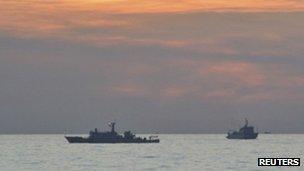US and Philippines begin South China Sea drills
- Published

Philippine and Chinese officials are holding talks on the stand-off at the Scarborough Shoal
Joint military exercises between the US and the Philippines are getting under way in the South China Sea, even as Manila remained locked in a stand-off with Beijing over a disputed shoal.
The annual exercises, called Balikatan, are due to run until 27 April.
This year they are taking place off Palawan, near parts of the South China Sea both Manila and Beijing claim.
Meanwhile Philippine and Chinese vessels remain at the Scarborough Shoal, a week after the deadlock began.
The Philippines said its warship found eight Chinese fishing vessels at the shoal - which both sides claim - when it was patrolling the area on 8 April.
When navy personnel boarded the Chinese fishing vessels on Tuesday they found a large amount of illegally-caught fish and coral, it said.
Two Chinese surveillance ships then arrived in the area, preventing the navy from making arrests.
Attempts to resolve the stand-off do not as yet appear to have been successful.
The Philippine warship has been replaced by a coast guard vessel and the Chinese fishermen are reported to have gone, but two Chinese vessels remain there and a Chinese aircraft overflew the Philippine ship on Sunday, officials in Manila said.
"The stalemate remains. Both sides are in touch with each other," Philippine foreign ministry spokesman Raul Hernandez said in a statement on Sunday.
'New context'
The joint exercises are taking place in a different area, to the southwest of the shoal. Some 7,000 troops will be taking part.
A Philippine military spokesman said that the exercises were unrelated to events at Scarborough Shoal.
The focus of the exercises would be on "improving security, counter-terrorism and humanitarian and disaster response", Major Emmanuel Garcia said.
At the opening ceremony, the Philippines' armed forces chief Jessie Dellosa hailed the joint exercise as ''timely and mutually beneficial''.
"The conduct of this annual event reflects the aspirations to further relations with our strategic ally, a commitment that has to be nurtured especially in the context of the evolving challenges in the region,'' he said.
The exercises take place every year but, reports the “óĻó“«Ć½'s diplomatic correspondent Jonathan Marcus, this year they are different because the context within which they are taking place has changed.
China's maritime power is growing and the Philippines - along with many other small countries in the region - is worried.
It wants to bolster its own defences and underline its growing ties with Washington, our correspondent says, and the US sees these exercises as an opportunity to demonstrate its renewed interest in Pacific security.
Six countries claim competing sovereignty over areas in the South China Sea, which is believed to contain huge deposits of oil and gas.
Along with China and the Philippines, they are Brunei, Malaysia, Vietnam and Taiwan.
China's claim includes almost the entire South China Sea, well into what the UN Convention on the Law of the Sea recognises as the 200-mile-from-shore Exclusive Economic Zones of other claimants.
That has led to occasional flare-ups and to competition to occupy islands, reefs and sandbars.
- Published16 April 2012
- Published8 January 2012
- Published9 February 2012